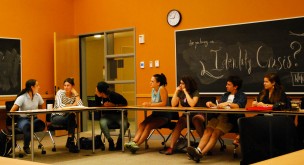A new publication with a grassroots feel creates a space for students to explore their identities.
The posters—featuring faceless figures under a simple heading that reads “Identity Crisis”— do not give away much information about the newest publication on Wesleyan’s campus. That, according to Identity Crisis founder Sasha Stahl ’17, is intentional.
The idea for Identity Crisis came to Stahl during a Feminist Underground meeting. She originally wanted to start a feminist newsletter, but then decided to expand on that concept.
“[I wanted] to broaden that idea and make it more inclusive,” Stahl said, adding that she hopes the resulting bimonthly newsletter will have several unifying qualities.
Stahl hopes that through the overarching theme of identity, students will find commonalities with others on campus through the sharing personal anecdotes in the newsletter, while also using the space to openly discuss identity differences.
“[It will be] empowering, relatable, ambitious, but doable,” Stahl said.
At the first interest meeting, Stahl had participants give their names and their “main identifier.” Comments included, “My spirit animal is a mongoose,” and “I’m a straight white Jewish girl from New York, so pretty much a dime a dozen at Wesleyan.”
The idea behind this introduction was to create an environment in which people can identify however they like, as opposed to being limited to categories that can be checked off in a box. This attitude is crucial to Stahl’s vision for Identity Crisis.
“[Identity Crisis will be] all-inclusive of all identities, empowering, and relevant to anyone who picks it up,” Stahl said.
The brevity of the publication is also significant. Stahl envisions something that can be picked up and glanced over while still having a lasting impact on the reader. She isn’t interested in hitting readers over the head with dogmatic writing. Rather, she is trying to give voice to all of the different identities of Wesleyan students in the hopes that all readers find at least one item that speaks to them.
“[It’s] handwritten and simple—not super literary,” Stahl said. “It’s quick, smart, and easily read on the go, not meant to mull over like a reading.”
To achieve this, Stahl has broken the newsletter into categories: Real Talk, which will feature a short personal anecdote, either by one of the editors or a contributing writer with an interesting story to share; Illustration Corner, which will feature a comic strip, a quotation from one of the editors, or a relevant reading; Something to Feel Good About, and conversely, Something to Feel Shitty About, which will feature facts of varying magnitudes; Current Events, a listing of events on campus that may be relevant to readers; Overheard this Week, featuring off-the-cuff tidbits of student conversation; and Person of the Week, which will profile a different Wesleyan student each week.
The published form of Identity Crisis also will also set it apart from other forums on campus: the publication will be handwritten.
“It will be [put] together, very literally, in a room,” Stahl said.
Editors, with the aid of contributing writers, will work together at meetings to finalize the written publication.
The first interest meeting had 23 students present, plus Stahl. Of those, the majority of students were sophomores. However, not all students were initially committed to the concept. As Stahl passed around a sign-up sheet, she made it clear that it was just fine to pass the sheet on after learning more about the organization. One sophomore, who wished to remain anonymous, signed up but cited her concerns.
“I’m scared to publish anything because I’m scared of having my opinions made permanent so that others can pass judgment on them,” she said. “I feel like I’m politically aligned with most of campus, but things can get stratified once they’re published.”
Despite the possible complications of the publication, Stahl and her new group of core editors are eager to embark on their mission of spreading acceptance and mutual understanding throughout campus.
